Alexander 2.5
Alexander the Great (*356; r. 336-323): the Macedonian king who defeated his Persian colleague Darius III Codomannus and conquered the Achaemenid Empire. During his campaigns, Alexander visited a.o. Egypt, Babylonia, Persis, Media, Bactria, the Punjab, and the valley of the Indus. In the second half of his reign, he had to find a way to rule his newly conquered countries. Therefore, he made Babylon his capital and introduced the oriental court ceremonial, which caused great tensions with his Macedonian and Greek officers.
The Anatolian highland
Spring in Phrygia
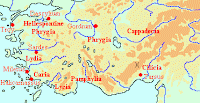
Control of the Anatolian highland, the satrapy of Phrygia, would improve the Macedonian grip on the southern shores of Turkey. It had the additional advantage that the country is fertile and offered sufficient fodder and grain for the Macedonian horses and his men; besides, the plains were suited for a cavalry battle. If Alexander had to meet Darius' army, this was a better place to fight than the coast strip.
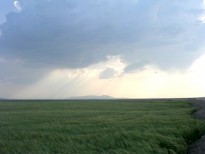
So the Macedonian armies conquered central Turkey during the winter. Parmenion invaded the country from Sardes in the west, drove out the remaining Persian troops and occupied the region. Alexander moved from Pamphylia through Pisidia to the north, capturing minor towns like Sagalassus. The two forces met each other in April 333 at Gordium, the capital of Phrygia, eighty kilometers west of modern Ankara.
The Macedonians were forced to stay here for some time. In the first place, the harvest was due and it would be stupid not to take a share of it. In the second place, reinforcements - 3,000 Macedonians and 1,000 Greeks - were brought in (which shows that the losses at Halicarnassus had been considerable). It should be noted that Alexander's eastern campaign slowly drained Macedonia of its manpower; the country never recuperated from this war.
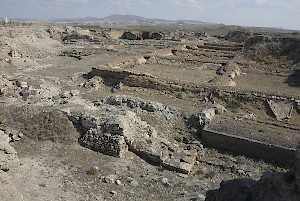
In the third place, the Persian commander Memnon had convinced the Spartan king Agis III that this was the moment to attack the Macedonian masters of Greece; and Memnon also launched an extremely successful naval offensive in the Aegean sea. Although Alexander had conquered the ports of Caria, Lycia and Pamphylia, Memnon still possessed many warships, which enabled him to occupy several Aegean islands and to threaten the Hellespont. Alexander dared not to go too far to the east and ordered Antipater, the commander of the Macedonian forces in Europe, to assemble a navy to stop this energetic Persian offensive. He must have regretted that he had allowed the disbandment of his old fleet after the capture of Miletus.
If Darius III would have opened negotiations at this stage of the war, and if he would have offered the Greek towns in Asia their independence, Alexander would have been under strong pressure to accept the proposal. But Darius had grown overconfident after Memnon's successes, and Alexander had grown overconfident because of the - indeed very remarkable - results of a one year campaign. Negotiations were no longer possible.
Between April and July the Macedonians consolidated their control of what is now Turkey, but the army remained inactive. Perhaps the soldiers were even bored. Now Alexander had heard that there was an old wagon, which had been dedicated to the supreme god by the legendary Phrygian king Midas. There was a legend that the man who loosened the knot binding the yoke to the pole, would become king of Asia, according to Alexander's biographers, who had the benefit of hindsight. Untying the knot was the least Alexander could do to entertain his men, but he tried in vain; knowing that this would look like a bad omen, he eventually lost his temper and cut the knot with his sword (text).
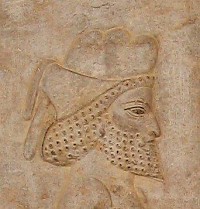
We do not know how the soldiers responded: they may have considered it false play, sacrilege, or a brilliant trick. But there was not much time to discuss: news came in that Memnon had fallen ill. (He was to die in August.) Although Memnon's successor Pharnabazus (the son of the Artabazus who had stayed at Philip's court when Alexander was young) continued the Persian offensive, Alexander ordered his men to continue their march.
The Cilician gate
As satrap of Phrygia, Alexander left Antigonus, a one-eyed general who was to play a very important role in the wars after Alexander's death. For the time being, he was left in a uncomfortable situation, because Alexander had not completely subdued Pisidia and the tribes in the north were undefeated too. He had only a few man, but managed to secure Alexander's rear. It was excellent generalship.
It was now late July, and after the Spring break, the army was well-prepared and well-provisioned. The soldiers marched along the Royal road, which connected the Persian capitals with Sardes. It was not a paved street, but it must have been the best road the Macedonian soldiers had ever seen. Unfortunately, they were not to enjoy the road very long: once they had passed Ankara and reached Cappadocia, they left the road and turned south to Cilicia.
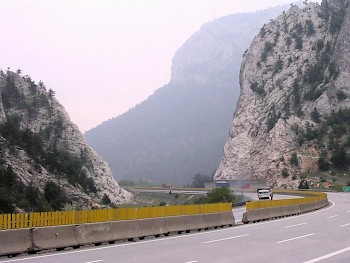
Alexander's generals were happy that they possessed a description of the road ahead. In 401, a large group of Greek mercenaries had marched to Babylonia and had taken the same route, which had been described by one of the Greek commanders, Xenophon, in a book called Anabasis. Alexander knew that he would have to pass the Cilician Gate, a cliff-bound mountain pass across the Taurus that could easily be blocked. Another problem the Macedonians had to face, was that the Persians had followed the scorched earth policy that Memnon had advised (above). The Macedonians marched through a region where the crops had been burnt and the pastures destroyed.
The Cilician gates, however, were not well defended. During the night, Alexander led an attack with his archers and light infantry and forced his way through. He arrived just in time to prevent the Persians from destroying Tarsus, the capital of Cilicia and Alexander's base from August to October 333.
The Macedonians had just reached Tarsus, when they received good and bad news. The good news was that the Greek mercenaries on the Persian navy in the Aegean sea had been recalled. The bad news was that the mercenaries had joined the enormous army of Darius III, which was, according to the reports, assembling in Babylonia and Syria.